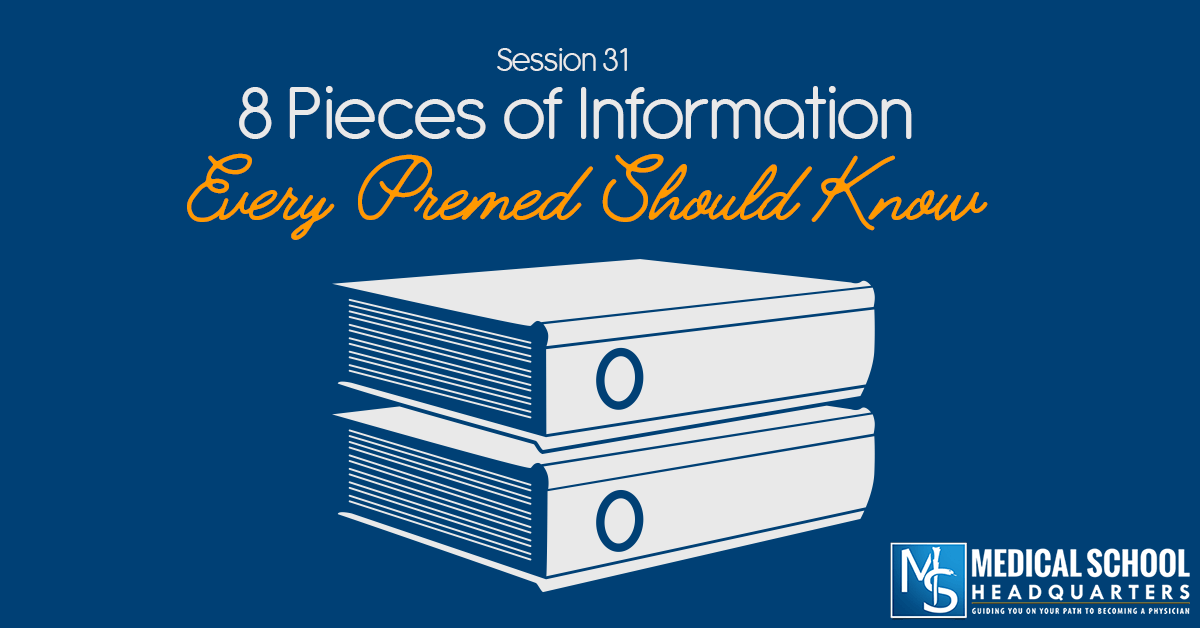Apple Podcasts | Google Podcasts
Session 31

The premed world is full of myths and misinformation. Let’s set the record straight about some of these things today. In this episode, we talk about 8 pieces of information and advice that every premed should hear as they’re going through this journey.
Listen to this podcast episode with the player above, or keep reading for the highlights and takeaway points.
8 Pieces of Advice Every Premed Should Hear
-
No perfect applicant
- There is no one picture of a perfect applicant that you need to fit into.
- Be who you are.
- Don’t waste all your time trying to figure out what boxes to check. There’s no such thing as a checklist to get into medical school.
- The admissions committee is looking for what makes you unique, not a “cookie cutter” applicant.
-
Choosing your undergrad
- I chose an undergrad based on an athletic program over academics.
- Allison chose McGill in Canada, which has a European method of teaching with narrow coursework.
- Several Canadian universities do not inflate grades and are more interested in accepting students from their own provinces.
- If you go to a Canadian medical school, you’re not considered a foreign medical graduate for residencies the US.
[Related post: Choosing the Best Premed School for Undergrad.]
-
BS/MD programs
These are 7 or 8-year BS/MD programs where you apply to an undergrad program and are accepted into medical school at the same time. If you’re a high-school student who has done shadowing and clinical experience and you already know you want to go into medicine, this is an option you can look into!
If you're a high-school student who has done shadowing and clinical experience and you know you want to go into medicine, look into BS/MD programs.Click To Tweet-
Broaden your coursework
FlexMed is a 7- year program where you get to apply to medical school as a sophomore in college. If you get accepted, you no longer have to take the MCAT and you get the chance to study more of whatever you want as a premed.
-
Respect the MCAT
- The MCAT is a test like no other. One of the most common mistakes students make is underestimating the MCAT, just thinking they’ll do well after taking the prereqs.
- It tests your ability to take the MCAT.
- The key is taking a lot of practice tests, and then reviewing them closely.
- You need to do practice tests under real conditions. Time yourself and take breaks like you really would on your test day. For more on how you can make the most of the official MCAT practice tests, check out episode 15 of The MCAT Podcast.
- Prep courses are great but be sure to do practice tests.
[Related episode: Best MCAT Course (with a Promo Code).]
-
Apply broadly.
- The average number of medical schools to apply to is 14.5, but apply to as many schools as you can.
- Be open to the possibility of going to a school out of your region.
- Find a school that fits with who you are and your interests in medicine.
[Related episode: How to Choose a Medical School & Put Together a School List.]
-
Apply early but not on the first day.
- Wait a couple of days to a week to let any glitches in the system work themselves out.
- The later you apply in the application cycle, the worse chances you have of getting an interview.
- The medical school application is like a game of musical chairs. As the application cycle goes on, medical schools accept more students, there are fewer spots remaining, and your chances decrease.
-
Enjoy the journey!
- Take time to enjoy the ride. Take time to soak in those moments of being a college student, while also delaying gratification at times, too.
- Life is about balance.
Links and Other Resources
- Check out my Premed Playbook series of books (available on Amazon), with installments on the personal statement, the medical school interview, and the MCAT.
- Related episode: What I Wish Every Premed Would Know.
- Related post: Premed 101: What You Need to Know to Get into Medical School.
- Need MCAT Prep? Save on tutoring, classes, and full-length practice tests by using promo code “MSHQ” at Blueprint MCAT (formerly Next Step Test Prep)!











